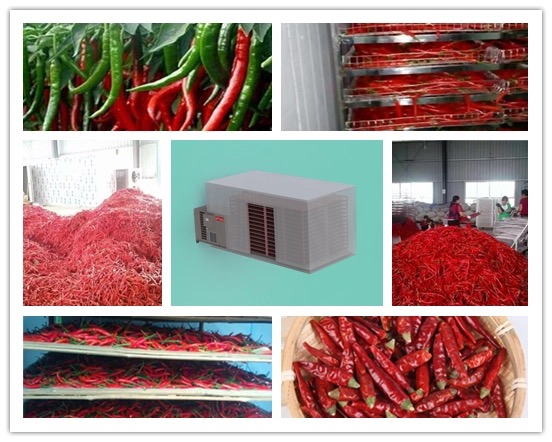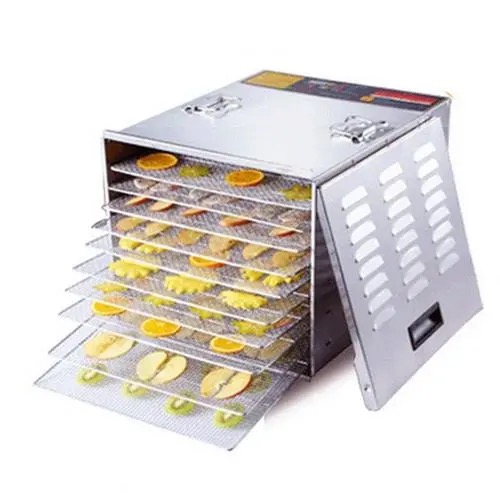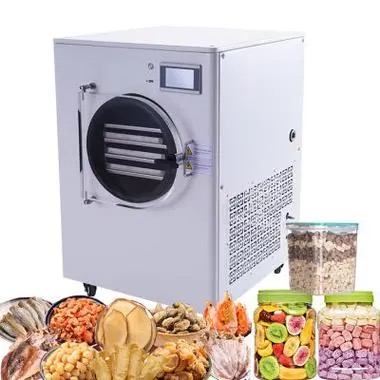
Content Menu
● Introduction
● Understanding Industrial Fruit Dehydrators
>> Key Features of Modern Fruit Dehydrators
● Commercial Vegetable Drying Equipment: A Closer Look
>> Types of Commercial Vegetable Dryers
● Food Dehydration Systems: Integrating Cutting-Edge Technology
>> Innovative Features in Food Dehydration Systems
● Freeze-Drying Technology for Produce: Preserving Quality at the Molecular Level
>> Advantages of Freeze-Drying for Fruits and Vegetables
● Large-Scale Fruit Processing Machinery: Meeting Industrial Demands
>> Components of Large-Scale Fruit Processing Systems
● Automated Vegetable Drying Solutions: Enhancing Efficiency and Consistency
>> Key Components of Automated Vegetable Drying Systems
● Multi-Functional Food Dehydration Machines: Versatility Meets Efficiency
>> Features of Multi-Functional Dehydrators
● Energy-Efficient Fruit Drying Equipment: Sustainability in Focus
>> Energy-Saving Features in Modern Fruit Dryers
● Industrial-Grade Produce Dehydrators: Built for Performance and Longevity
>> Characteristics of Industrial-Grade Dehydrators
● Advanced Vegetable Preservation Technology: Beyond Traditional Drying
>> Emerging Technologies in Vegetable Preservation
● Conclusion
● Frequently Asked Questions
>> 1. What are the main advantages of using industrial fruit and vegetable drying machines?
>> 2. How do freeze-drying and traditional air drying methods compare in terms of product quality?
>> 3. What factors should be considered when choosing a commercial vegetable drying equipment?
>> 4. How can automated vegetable drying solutions improve production efficiency?
>> 5. What are some emerging trends in industrial fruit and vegetable drying technology?
Introduction
In today's fast-paced world, the demand for efficient and high-quality food preservation methods has never been greater. Among the various techniques available, industrial fruit and vegetable drying has emerged as a game-changer in the food processing industry. This comprehensive guide delves into the world of dryer machines, exploring their applications, benefits, and the latest technological advancements that are reshaping the landscape of food preservation.
Understanding Industrial Fruit Dehydrators
Industrial fruit dehydrators are sophisticated machines designed to remove moisture from fruits and vegetables, extending their shelf life while preserving nutritional value and flavor. These powerful devices utilize various drying methods, including hot air circulation, freeze-drying, and infrared technology, to achieve optimal results for different types of produce.
Key Features of Modern Fruit Dehydrators
1. Temperature Control: Precise temperature regulation ensures that fruits are dried at the optimal temperature, preserving their nutritional content and natural flavors.
2. Adjustable Airflow: Variable airflow settings allow for customized drying processes, catering to different fruit types and desired end products.
3. Multiple Trays: Large-capacity trays enable the simultaneous drying of various fruits, increasing efficiency and output.
4. Digital Controls: User-friendly interfaces and programmable settings make operation simple and allow for consistent results.
5. Energy Efficiency: Advanced designs incorporate energy-saving features, reducing operational costs and environmental impact.
Commercial Vegetable Drying Equipment: A Closer Look
Commercial vegetable drying equipment is essential for businesses looking to preserve large quantities of vegetables efficiently. These machines are designed to handle high volumes of produce while maintaining consistent quality across batches.
Types of Commercial Vegetable Dryers
1. Tray Dryers: Ideal for a wide range of vegetables, tray dryers offer flexibility and ease of use.
2. Tunnel Dryers: Continuous-flow systems perfect for large-scale operations with high throughput requirements.
3. Spray Dryers: Suitable for liquid vegetable products, creating fine powders with extended shelf life.
4. Fluidized Bed Dryers: Excellent for uniform drying of small, granular vegetable products.

Food Dehydration Systems: Integrating Cutting-Edge Technology
Modern food dehydration systems incorporate advanced technologies to enhance efficiency, product quality, and versatility. These integrated solutions offer a holistic approach to fruit and vegetable drying, often combining multiple drying methods in a single unit.
Innovative Features in Food Dehydration Systems
1. Smart Sensors: Real-time monitoring of moisture content, temperature, and humidity ensures precise control throughout the drying process.
2. Automated Loading and Unloading: Robotic systems streamline the handling of produce, reducing labor costs and improving hygiene.
3. Data Analytics: Built-in software analyzes drying patterns and product quality, enabling continuous process optimization.
4. Remote Monitoring: IoT-enabled systems allow operators to monitor and control the drying process from anywhere, enhancing operational flexibility.
Freeze-Drying Technology for Produce: Preserving Quality at the Molecular Level
Freeze-drying, also known as lyophilization, is a premium drying method that offers unparalleled quality retention for fruits and vegetables. This technology involves freezing the produce and then removing the ice through sublimation, resulting in a product that maintains its original shape, color, and nutritional value.
Advantages of Freeze-Drying for Fruits and Vegetables
1. Superior Nutrient Retention: The low-temperature process preserves vitamins, minerals, and antioxidants more effectively than traditional drying methods.
2. Extended Shelf Life: Freeze-dried products can last for years without refrigeration, making them ideal for long-term storage and emergency food supplies.
3. Lightweight and Portable: The removal of water significantly reduces weight, making freeze-dried fruits and vegetables perfect for outdoor activities and space-saving storage.
4. Rapid Rehydration: Freeze-dried produce quickly absorbs water, returning to its original texture and flavor when reconstituted.
Large-Scale Fruit Processing Machinery: Meeting Industrial Demands
As global demand for dried fruits continues to rise, large-scale fruit processing machinery has become essential for meeting market needs. These industrial-grade systems are designed to handle massive quantities of fruits, offering high throughput and consistent quality.
Components of Large-Scale Fruit Processing Systems
1. Washing and Sorting Units: Automated systems clean and grade fruits before drying, ensuring only the highest quality produce enters the drying process.
2. Cutting and Slicing Machines: Precision cutting equipment prepares fruits for optimal drying, ensuring uniform pieces for consistent results.
3. Multi-Stage Drying Chambers: Large-capacity chambers with multiple drying zones allow for precise control over the drying process, catering to different fruit types and desired end products.
4. Packaging Lines: Integrated packaging solutions seal dried fruits in appropriate containers, maintaining quality and extending shelf life.
Automated Vegetable Drying Solutions: Enhancing Efficiency and Consistency
Automation has revolutionized the vegetable drying industry, offering unprecedented levels of efficiency, consistency, and quality control. Automated vegetable drying solutions integrate various technologies to create seamless, end-to-end processing systems.
Key Components of Automated Vegetable Drying Systems
1. Conveyor Systems: Automated conveyor belts transport vegetables through different stages of the drying process, minimizing human intervention and reducing contamination risks.
2. Vision Systems: Advanced cameras and AI-powered software inspect vegetables for quality, automatically removing substandard produce.
3. Climate Control: Sophisticated environmental control systems maintain optimal temperature, humidity, and airflow throughout the drying process.
4. Automated Packaging: Robotic systems package dried vegetables, ensuring consistent portion sizes and hygienic handling.

Multi-Functional Food Dehydration Machines: Versatility Meets Efficiency
In response to diverse market demands, multi-functional food dehydration machines have gained popularity among food processors. These versatile systems can handle a wide range of fruits, vegetables, and other food products, offering flexibility and cost-effectiveness for businesses.
Features of Multi-Functional Dehydrators
1. Interchangeable Trays: Customizable tray configurations allow for drying different types and sizes of produce.
2. Multiple Drying Modes: Programmable settings for various drying methods, including air drying, freeze-drying, and infrared drying.
3. Modular Design: Expandable systems that can grow with business needs, allowing for easy capacity increases.
4. User-Friendly Interfaces: Intuitive controls and pre-set programs for different food types simplify operation and ensure consistent results.
Energy-Efficient Fruit Drying Equipment: Sustainability in Focus
As environmental concerns take center stage, energy-efficient fruit drying equipment has become a priority for both manufacturers and users. These eco-friendly solutions not only reduce operational costs but also minimize the carbon footprint of food processing operations.
Energy-Saving Features in Modern Fruit Dryers
1. Heat Recovery Systems: Recirculation of hot air reduces energy consumption and improves overall efficiency.
2. Solar Integration: Hybrid systems that incorporate solar panels to supplement traditional energy sources.
3. Intelligent Power Management: Smart controls that optimize energy use based on load and environmental conditions.
4. Insulation Improvements: Advanced insulation materials that minimize heat loss and improve thermal efficiency.
Industrial-Grade Produce Dehydrators: Built for Performance and Longevity
Industrial-grade produce dehydrators are the workhorses of the food processing industry, designed to operate continuously under demanding conditions. These robust machines are built with durability and performance in mind, ensuring reliable operation and consistent output.
Characteristics of Industrial-Grade Dehydrators
1. Stainless Steel Construction: Corrosion-resistant materials ensure longevity and easy cleaning.
2. Heavy-Duty Components: Industrial-strength motors, fans, and heating elements designed for continuous operation.
3. Scalability: Modular designs allow for easy expansion to meet growing production needs.
4. Compliance with Industry Standards: Built to meet strict food safety and quality regulations.
Advanced Vegetable Preservation Technology: Beyond Traditional Drying
The field of vegetable preservation is constantly evolving, with new technologies emerging to complement and enhance traditional drying methods. These advanced solutions offer improved quality, efficiency, and product diversity.
Emerging Technologies in Vegetable Preservation
1. Pulsed Electric Field (PEF) Treatment: Uses short electric pulses to improve drying efficiency and maintain product quality.
2. Ultrasound-Assisted Drying: Enhances moisture removal and reduces drying time through acoustic cavitation.
3. Microwave Vacuum Drying: Combines microwave heating with vacuum pressure for rapid, low-temperature drying.
4. Osmotic Dehydration: Pre-treatment process that removes water from vegetables using a concentrated solution, improving texture and flavor retention.
Conclusion
The world of industrial fruit and vegetable drying machines is a dynamic and innovative field, constantly evolving to meet the demands of a growing global population and changing consumer preferences. From energy-efficient designs to advanced preservation technologies, these machines play a crucial role in ensuring food security, reducing waste, and delivering high-quality dried produce to markets worldwide.
As we look to the future, the integration of artificial intelligence, IoT connectivity, and sustainable practices will likely drive further advancements in this industry. For businesses involved in food processing, staying informed about these technological developments and investing in state-of-the-art drying equipment will be key to maintaining a competitive edge in the market.

Frequently Asked Questions
1. What are the main advantages of using industrial fruit and vegetable drying machines?
Answer: Industrial fruit and vegetable drying machines offer numerous benefits, including extended shelf life of produce, preservation of nutritional value, reduction of storage space requirements, year-round availability of seasonal fruits and vegetables, and minimization of food waste. These machines also allow for large-scale production, consistent quality, and the creation of value-added products.
2. How do freeze-drying and traditional air drying methods compare in terms of product quality?
Answer: Freeze-drying generally produces higher quality dried products compared to traditional air drying. Freeze-dried fruits and vegetables retain more of their original color, flavor, and nutritional content due to the low-temperature process. They also maintain their original shape and rehydrate quickly. However, freeze-drying is typically more expensive and energy-intensive than air drying, which is simpler and more cost-effective for large-scale operations.
3. What factors should be considered when choosing a commercial vegetable drying equipment?
Answer: When selecting commercial vegetable drying equipment, consider the following factors: production capacity needs, types of vegetables to be dried, desired end-product quality, available space, energy efficiency, ease of operation and maintenance, initial investment costs, and long-term operational expenses. Additionally, consider the equipment's flexibility to handle different products and its compliance with food safety regulations.
4. How can automated vegetable drying solutions improve production efficiency?
Answer: Automated vegetable drying solutions enhance production efficiency in several ways:
- Reduced labor costs and human error through automated handling and processing
- Consistent product quality due to precise control of drying parameters
- Increased throughput with continuous operation capabilities
- Improved food safety through minimized human contact
- Real-time monitoring and data analytics for process optimization
- Flexibility to handle various products with programmable settings
5. What are some emerging trends in industrial fruit and vegetable drying technology?
Answer: Emerging trends in industrial fruit and vegetable drying technology include:
- Integration of IoT and AI for smart, connected drying systems
- Development of hybrid drying technologies combining multiple methods for optimal results
- Focus on energy-efficient and sustainable drying solutions
- Incorporation of non-thermal preservation techniques like high-pressure processing
- Advancements in packaging technology to extend the shelf life of dried products
- Customization of drying processes for novel and exotic fruits and vegetables
- Increased use of sensors and data analytics for quality control and process optimization












